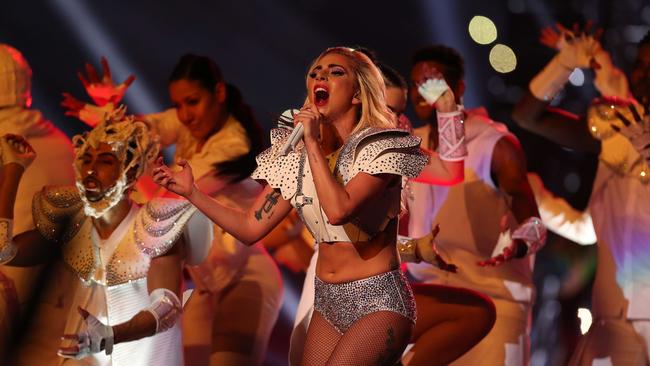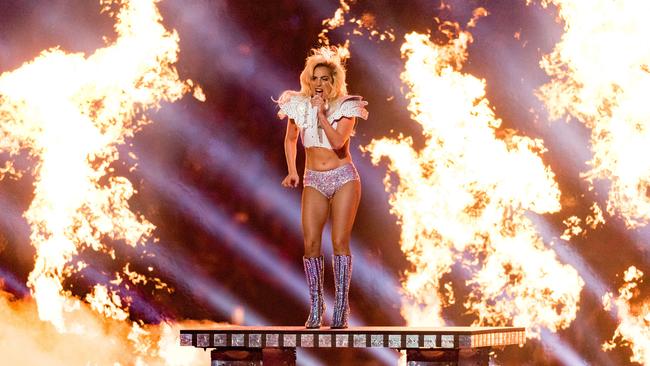Fat shamers, you’re just mindless puppets
In the same week Lady Gaga was fat shamed for her Super Bowl ‘flab’, Christie Brinkley was likened to Jesus for still looking hot at 63. We’ve got to get smarter.

Rendezview
Don't miss out on the headlines from Rendezview. Followed categories will be added to My News.
It seems the parameters for being classified as fat have just shrunk to a whole new level.
After Lady Gaga’s epic halftime performance at the 2017 Super Bowl this week, people took to… wait for it… Twitter to slag off the mega-talented performer. The object of their disgust was Gaga’s stomach.
During the 13-minute, high calibre performance, some technologically advanced viewers — obviously masters in the art of the “screen grab” — took it upon themselves to freeze-frame moments of action at the exact moment Gaga’s stomach skin pushed over her pants. OMG, muffin top!
I can see why Lady Gaga was breathing so heavy, her stomach was protesting her #SuperBowl performance. #LULZ #Gaga #LadyGaga @LadyGaga pic.twitter.com/AyzYEMkj2v
— PoliticsGhost🸠(@PoliticsGhost) February 6, 2017
It’s not too hard to see through this sort of over-the-top social media reaction. People take to Twitter to spurt insults at others because a) it gives them attention that they couldn’t dream of getting in their banal lives and b) some people get a kick out of being mean. I guess it makes them feel better about themselves.
It does make you think though, because, as always, fat shaming makes headlines and triggers heated conversation.
The media and people are calling Lady Gaga fat... can I be fat then? ðŸ˜ðŸ˜ðŸ˜ðŸ˜ðŸ˜#ShesHot pic.twitter.com/yUf2RY451j
— Sydney Childs (@SydneeyJanee) February 7, 2017
What also gets people talking is a well-known person looking hot.
In the same week people ridiculed Gaga’s stomach skin, 63-year-old supermodel Christie Brinkley was likened to Jesus because she STILL looks amazing.
She was photographed by Sports Illustrated with her two “absolutely gorgeous” daughters. The trio do look amazing in their bikins. Good on them.
In the photo, Mumma Brinkley appears to be walking on water. Because if you can look hot at 63, you deserve to be worshipped like the supposed saviour of humankind. Yet there was no acknowledgment of the holy trinity of cosmetic enhancements, lighting effects and Photoshop.
The obsession with the ‘perfect’ body image has reached impractical and unrealistic levels. Any hot, fit thing can accumulate thousands of Instagram followers and subsequently live off the freebies thrown at them from companies wanting their goods photographed next to said hot, fit thing.
Many of us are old enough and normal enough to not pay attention to the “evil fat shamers” and go about living our lives, perfectly at peace with the muffin top popping over our pants. But these attitudes do cause damage as they seep into our collective subconscious.
Body Positive Australia co-director Fiona Sutherland said reactions such as those to Gaga’s appearance can “perpetuate the idea that there are ‘good’ bodies and ‘bad bodies’.”
“These comments keep us preoccupied with our appearance and feeling like we’re never ‘good enough’,” she says. “At best, this leads to a perpetual sense of anxiety and unease about our bodies, regardless of size and at worst can lead to dieting, disordered eating and eating disorders.
“Not only that, it ignores the incredible attributes that people have such as generosity, kindness or tenacity that have nothing to do with appearance. When children grow up thinking that the most important thing about them is how they look, we have a massive problem on our hands.”
Sutherland says body shaming isn’t a new thing, we just notice it more now, possibly because of the rise of social media.
“People’s expectations about appearance haven’t necessarily changed a lot this century,” she says. “Women’s appearance has always been elevated to a point way beyond that which is reasonable. The way we’re taught to think and feel about our bodies starts in our own families but then once children spend more time at school and less time with family, their circle of influence grows exponentially.
“For example, when we comment on the appearance of a little girl, for example ‘Oh look at your cute dress/hair’ etc... we are already sending the message that appearance is important. Then we may move to greet our friends in this same way too.”

A friend of mine, who is a professional photographer, snapped a candid photo of me in a bikini at the beach recently. The photo is flawless… beautifully framed using surrounding rocks, shadows are just right, I look so relaxed and at peace. He sent it to me and my initial reaction was to feel a bit sick, embarrassed and sadly ashamed. All I could think was: Why didn’t I suck my gut in? A stupid thought because it was a lovely photo of me looking happy in a place I love with my dogs, who I also love. Definitely a keeper and one I’m sure I’ll look at when I'm old and which I still looked like that.
But I couldn’t shake the shame. If I was famous and that was a pap shot, I’m sure I’d be making “baby bump” headlines. I’m by no means fat, but by Lady Gaga fat shamer standards, I guess they’d be having a jab. My brain was body shaming myself before I even realised it was.
Sutherland says we can challenge these thoughts by making a “conscious effort to change the conversation away from appearance and on to what really matters”.
“Body shaming seems to be a national pastime, one that might seem innocuous or harmless. In fact, body shaming is just a symptom of our culture’s over-focus and obsession with appearance that perpetuates guilt, shame and disconnection with food, eating and our bodies.”
It’s important to remember our bodies are always changing. Hormones, stress, food, tequila, exercise and lack of… regularly change the way we look.
So why are we so obsessed with the appearances of others? It’s simple, we’re puppets who give in to a collective way of thinking and allow all the clever marketing and images of beautiful people to anchor into our subconscious and direct how we think. If we want to be happier humans, we need to start challenging this.
I include myself in the puppet party but I’m making more of an effort to reprogram my own thoughts and ideas of beauty. Wouldn’t it be nice if we could all make a little effort to do the same and start realising there are worthier things to worry about?


